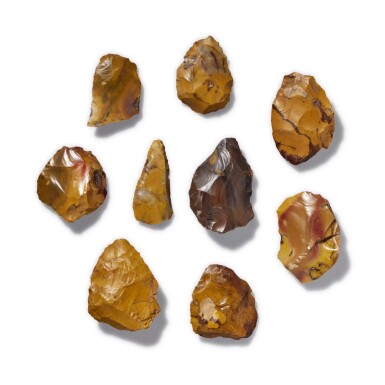
Set of Neanderthal Tools
Middle Paleolithic (approx. 300,000-40,000 years ago), Fontmort (Fontmaure), France
No reserve
Auction Closed
July 17, 03:28 PM GMT
Estimate
5,000 - 8,000 USD
Lot Details
Description
Set of Neanderthal Tools
Produced by Homo neanderthalensis
Middle Paleolithic (approx. 300,000-40,000 years ago)
Fontmort (Fontmaure), France
A set of nine multi-colored jasper tools consisting of handaxes (bifaces) and scrapers, ranging in size from 2½ to 3 inches (62 to 77 mm) in length. Evidence of flake-knapping from a prepared core. Collection marks on five of the nine tools indicating Fontmort/Fontmore (Fontmaure, Vienne, Central France) collection site.
Field collected in Fontmort/Fontmore (Fontmaure), Vienne, Central France.
Subsequently in the collection of Michel Geslin, President of the Amis du Musée de Préhistoire du Grand-Pressigny.
Included with French and European Union export licenses.
A GORGEOUS SET OF MULTI-COLORED JASPER TOOLS MADE BY THE NEANDERTHALS, OUR CLOSEST HUMAN RELATIVES
Neanderthals (Homo neanderthalensis) are the closest extinct relative of modern humans, having lived from approximately 400,000 to 40,000 years ago throughout Europe and Asia. Despite being shorter and stockier on average than modern humans, their brains were as large or larger than ours. Modern humans of European and Asian origin have between 1-4% Neanderthal DNA, and recent studies have shown that modern humans of African origin also share Neanderthal DNA, providing evidence that Homo sapiens traveled back and forth between Europe, Asia, and Africa after interbreeding with Neanderthals.
The Neanderthal stone toolmaking industry - formally known as the Mousterian - defined the Middle Paleolithic in Europe and was more developed and complex than the Acheulean handaxe industry of the Lower Paleolithic (see Lots 46, 47, and 48). Neanderthal stone tools were varied in shape and purpose, with blades, handaxes, and spears for hunting and butchering being common, alongside scrapers and awls that would have been used to clean and sew together animal hides for clothing. The set of tools offered here includes both handaxes and scrapers.
These Neanderthal tools were field collected in Fontmort/Fontmore (Fontmaure), Vienne, Central France. The tools found at Fortmort are unique and can be distuished by their being crafted out of multi-colored jasper, a type of Cretaceous microcrystalline quartz. These tools were previously in the collection of Michel Geslin, President of the Amis du Musée de Préhistoire du Grand-Pressigny, and are included with export licenses from both the French government and the European Union.
REFERENCES:
Pradel, Louis. Les Gisements de Fontmaure. Paléolithique Inférieur, Moustérien de Tradition Acheuléenne, Moustérien Final à Lames. Toulouse, France: Institut d’Art Préhistorique de la Faculté des Lettres et Sciences Humaines de Toulouse, 1967.
Wilson, Richard. “Eschewing Bear Tracks: Fallacies, Figure-Stones and Fontmaure.” Rock Art Research 35, no. 2 (2018): 145–79.
